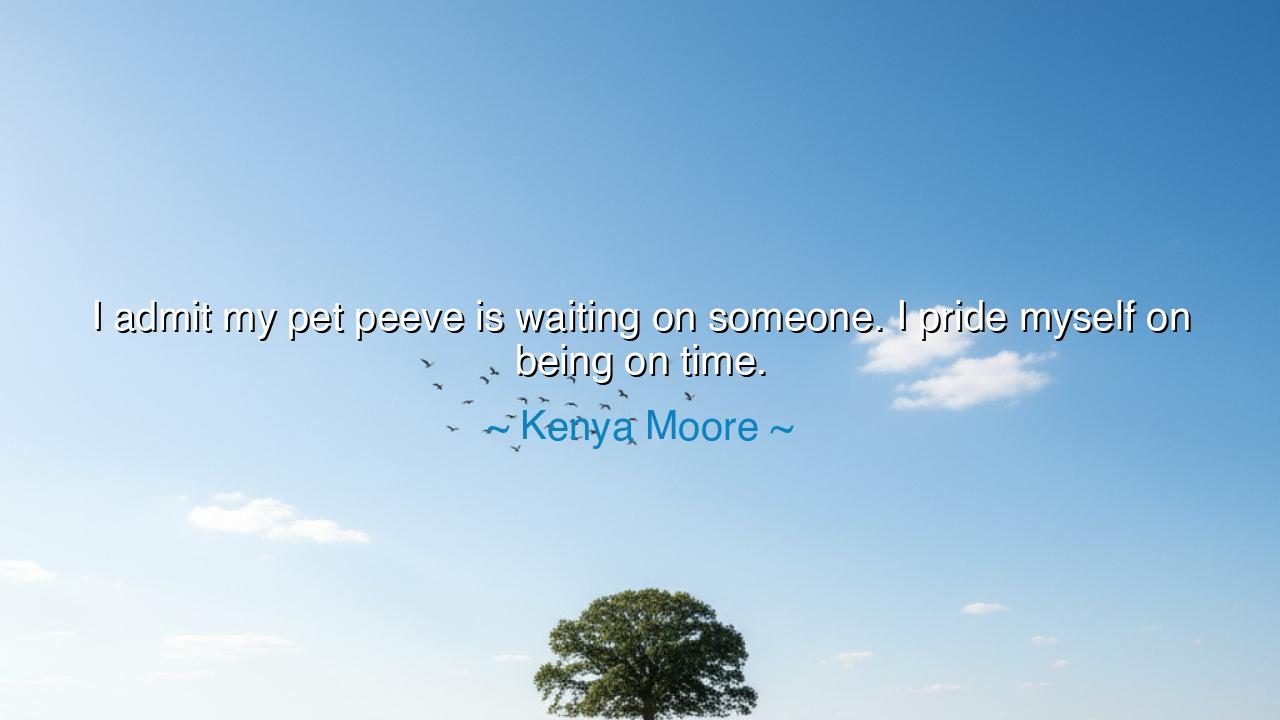
I admit my pet peeve is waiting on someone. I pride myself on






"I admit my pet peeve is waiting on someone. I pride myself on being on time." Thus spoke Kenya Moore, actress, creator, and voice of candor, revealing in her words a principle that echoes through the halls of all civilizations: the sacredness of time. Her annoyance at waiting is not mere impatience, but the cry of a soul that honors discipline, respect, and the fleeting hours of life. To be on time is more than punctuality; it is a covenant with oneself and with others, a declaration that one values both the present moment and the dignity of those who share it.
The ancients held time in awe. The Greeks personified it as Chronos, devourer of all things, who consumes kings and peasants alike. The Romans carved into their walls, Tempus fugit—time flies. To waste it was not a small failing, but a sin against life itself. In this way, Kenya Moore’s irritation at waiting becomes a reflection of timeless wisdom: to make another wait without cause is to steal what cannot be returned, to take from them the most precious currency—their hours.
Her second phrase, "I pride myself on being on time," reveals something even greater. For pride here is not arrogance, but a mark of integrity. To be punctual is to show respect—to say to others, your time is valuable, and I will not waste it. It is also a matter of self-mastery: the one who governs their own minutes governs their destiny. The armies of Alexander the Great marched in triumph not only because of courage, but because of discipline. The difference between chaos and victory lay in the measure of the clock.
History offers us tales of leaders who knew the weight of time. George Washington was renowned for his punctuality, demanding that meals begin at the appointed hour, whether or not all were present. He knew that lateness bred disorder, and disorder corroded the foundations of trust. On the other hand, Napoleon, though brilliant, often ignored schedules, leaving his ministers and allies waiting, frustrated and uncertain. In such small cracks, the weakness of empires begins to grow. Thus, Moore’s insistence on timeliness stands in the company of great leaders: for what begins as punctuality in small things ripens into strength in greater matters.
Yet there is also an emotional truth here. To wait endlessly is to feel dismissed, unvalued, made lesser. It is as though the one who is late proclaims, my life matters more than yours. This wound, though silent, cuts deeply. Kenya Moore’s words are therefore not only about herself—they speak for all who have felt invisible while waiting for those who failed to honor their promise. To keep time is to keep trust.
O children of tomorrow, hear this teaching: honor the hours, both your own and those of others. Do not fall into the trap of carelessness, thinking, They will forgive me; minutes are nothing. For minutes are the seeds of years, and when wasted, they do not return. Make punctuality your virtue, not for vanity’s sake, but as a sign of respect, discipline, and reverence for life itself.
Therefore, practice this: rise early, prepare well, and let your word be as steady as the sun. If you promise to meet at a time, let that time be sacred. And if others fail you, do not grow bitter, but let their carelessness remind you of the strength of your own commitment. In this way, you will live not as a drifter lost in wasted hours, but as a steward of time, whose presence inspires confidence and whose discipline becomes the root of success.
Thus the teaching of Kenya Moore endures: that to be on time is no small matter, but a reflection of character, respect, and strength. The one who honors time honors life. The one who wastes it dishonors themselves and those around them. Choose, then, the path of punctuality, and you will find not only efficiency, but also dignity, trust, and the quiet triumph of living fully in each moment.






AAdministratorAdministrator
Welcome, honored guests. Please leave a comment, we will respond soon